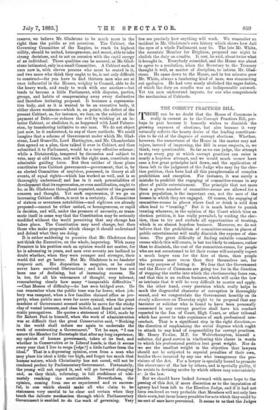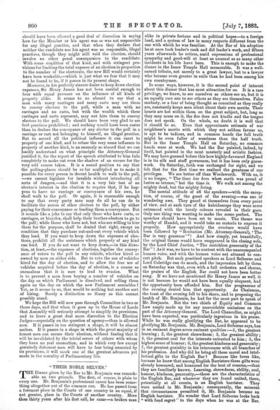THE CORRUPT PRACTICES BILL.
THERE can be no doubt that the House of Commons is really in earnest as to the Corrupt Practices Bill, per- haps in part because it honestly wishes to diminish the growing expenses of elections, but also because it very naturally reflects the hearty desire of the leading constituen- cies to be rid of the disgrace of corrupt elections. Whether, however, the earnestness of the House in the matter may not injure, instead of improving, the Bill in some respects, is, we think, very questionable. So far as we can judge, the attempt to stop every gap at which corrupt practices can enter is nearly a hopeless attempt, and we would much sooner have seen a few great principles laid down, and the application of them left to the judgment of the Judge who may try the elec- tion petition, than have had all this paraphernalia of complex prohibition and exception. For instance, it was surely a mistake to prohibit the engaging of committee-rooms in any place of public entertainment. The principle that not more than a given number of committee-rooms are allowed for a given population, is the important one, not the uses of the houses in which they are engaged. Of course, the engaging of committee-rooms in places where food or drink is sold does often lead to "treating." But it is much better to punish treating wherever, in the opinion of the Court which tries an election petition, it has really prevailed, by voiding the elec- tion, than to try and exclude all opportunities of treating, which is an almost hopeless business. Moreover, we do not believe that the prohibition of committee-rooms in places of public entertainment will really diminish the expense of elec- tions. The great difficulty of finding suitable committee- rooms which this will create, is but too likely to enhance, rather than to diminish, the cost of the committee-rooms, for people who are not accustomed to let their rooms will naturally expect a much larger sum for the hire of them, than people who possess more room than they themselves use, for the very purpose of letting it. We fear that the Government and the House of Commons are going too far in the direction of stopping the earths into which the electioneering foxes run, and that this is an endless business, which will make the law so intricate that it will be very difficult to master and apply. On the other hand, every provision which really helps to mark the disgraceful character of corruption is thoroughly round, and we congratulate the Government heartily on ite steady adherence on Thursday night to its proposal that any barrister or solicitor who is found to have been personally concerned in any corrupt practice shall have his conduct reported to the Inn of Court, High Court, or other tribunal which has power to take cognisance of such professional mis- conduct. That is a significant step in the right direction,— the direction of emphasising the social disgrace which ought to attach to any kind of responsibility for corrupt practices. Mr. Henry Fowler, M.P. for Wolverhampton, himself a solicitor, did good service in vindicating this clause in words to which his professional position lent great weight. Nor do we see the smallest weight in the objection that lawyers should not be subjected to especial penalties of their own, besides those incurred by any one who transgresses the pro- visions of the Act. For a lawyer is specially bound to promote the observance of the law by others, and is specially guilty, if 'he assists in devising modes by which others may conveniently e7. le the law.
But we should have looked forward with more hope to the passing of this Act, if more discretion as to the imputation of agency had been left to the Election Judge, and if it had not been rendered so very probable that Members will not only lose their seats, but incur heavy penalties for acts which they could by no sort of eare have prevented. It seems to us that the Judges should have been allowed a good deal of discretion in saying how far the Member or his agent was or was not responsible for any illegal practice, and that when they declare that neither the candidate nor his agent was so responsible, illegal practices, though they might still void the election, should involve no other penal consequerices to the candidate. With some condition of that kind, and with stringent pro- visions for limiting the total expense of an election in proportion to the number of the electorate, the new Bill would certainly have been workable,—which is just what we fear that it may not be found to be, if it passes in its present shape. Moreover, in his perfectly sincere desire to keep down election expenses, Sir Henry James has not been careful enough to bear with equal pressure on the influence of all kinds of property alike. It seems to us absurd to say that a man with many carriages and many carts may use them to convey electors to the poll, while a man with no carriages and no carts, but with the wealth which these carriages and carts represent, may not hire them to convey electors to the poll. We should have been very glad to see both practices prohibited ; and nothing would have been easier than to declare the conveyance of any elector to the poll in a carriage or cart not belonging to himself, an illegal practice. But to accord all the political influence it can exert to property of one kind, and to refuse the very same influence to property of another kind, is an anomaly so absurd that we can hardly understand on what principle the Attorney-General justified it, for the report of the speech attributed to him fails completely to make out even the shadow of an excuse for the very odd course taken. It is a sound position to say that the polling-places should be so far multiplied as to make it possible for every person in decent health to walk to the poll, —we cannot legislate for invalids without introducing all sorts of dangers,—and that it is a very fair test of an elector's interest in the election to require that, if he hap- pens to have no carriage or conveyance of his own, he shall walk to the poll. Or again, it is reasonable enough to say that every party man may do all he can do to facilitate the access of other electors to the poll, by either paying for their conveyance or lending them a conveyance. But it sounds like a joke to say that only those who have carts, or carriages, or bicycles, shall help their brother-electors to go to the poll ; while those who have not, but who are willing to hire them for the purpose, shall be denied that right, except on condition that they purchase out-and-out every vehicle which they lend. If you want to keep down the expenses of elec- tions, prohibit all the assistance which property of any kind can lend. If you do not want to keep down,—in this direc- tion, at least,—the expenses of elections, legalise the convey- ance of voters to the poll in any vehicle, whether hired or owned by men on either side. But to veto the use of vehicles hired for the day of election' and to allow the free use of vehicles acquired before the day of election, is a course so anomalous that it is sure to lead to evasion. What is to prevent a man from buying a number of vehicles on the day on which Parliament is dissolved, and selling them again on the day on which the new Parliament assembles ? Yet, as it seems to us, that would be nothing but another sort of hiring. Surely a distinction so flimsy as this cannot possibly stand. We hope the Bill will now pass through Committee in two or three days, and that when it goes up to the House of Lords that Assembly will seriously attempt to simplify its provisions, and to leave a great deal more discretion to the Election Judges—especially on the question of agency—than is allowed now. If it passes in too stringent a shape, it will be almost useless. If it passes in a shape in which the great majority of honest men can secure their election, without fearing that it will be invalidated by the trivial errors of others with whom they have no real connection, and in which very few except genuinely dishonest men will have to fear being unseated by its provisions, it will mark one of the greatest advances yet made in the morality of Parliamentary life.



































 Previous page
Previous page